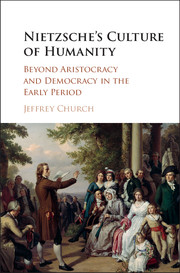Book contents
- Frontmatter
- Dedication
- Contents
- Preface
- List of abbreviations
- Introduction
- PART I The Foundation of Culture in the Early Nietzsche
- 1 The Influence of Kant and Herder
- 2 Nihilism and the Contradiction of Human Nature
- 3 Freedom and the Best Life
- Part II Two Concepts of Culture in the Early Nietzsche
- PART III The Means to Culture in the Early Nietzsche
- PART IV The Significance of the Early Period
- Bibliography
- Index
2 - Nihilism and the Contradiction of Human Nature
from PART I - The Foundation of Culture in the Early Nietzsche
Published online by Cambridge University Press: 05 October 2015
- Frontmatter
- Dedication
- Contents
- Preface
- List of abbreviations
- Introduction
- PART I The Foundation of Culture in the Early Nietzsche
- 1 The Influence of Kant and Herder
- 2 Nihilism and the Contradiction of Human Nature
- 3 Freedom and the Best Life
- Part II Two Concepts of Culture in the Early Nietzsche
- PART III The Means to Culture in the Early Nietzsche
- PART IV The Significance of the Early Period
- Bibliography
- Index
Summary
With the debate between Kant and Herder in the background, we can now turn to Nietzsche and in particular to what motivates his interest in culture. The basic problem driving Nietzsche's concern for culture is that natural human existence is not worth living. In The Birth of Tragedy, Nietzsche voices Silenus's truth about “the terrible or absurd nature of existence,” a view already anticipated in Kant's Critique of Judgment (BT 7/40). This idea of the valuelessness of natural existence – what he comes to call “nihilism” – can be dangerous, tearing a “people” apart and leading to “utilitarian vulgarity” (UM.2.9) and a “horrifying ethic of genocide” (BT 15/74). In response to nihilism, Nietzsche argues that we must uphold culture, especially in the wake of the modern age's steady erosion of traditional and religious justifications for existence. The problem of nihilism, then, frames Nietzsche's understanding of the basis and purpose of culture. Accordingly, the basic thrust of Nietzsche's cultural project is similar to Kant's and Herder's, who, as we saw in Chapter 1, thought that the development of modern civilization leads to materialism, selfishness, and existential malaise.
In the first part of this chapter, I argue that scholars have misunderstood the character of Nietzsche's view of nihilism and hence the basis for his ethical argument. My argument is that natural existence is worthless not because nature is bad, but rather because of the contradictory nature of the human telos. In the second part of the chapter, I then reconstruct Nietzsche's account of the genesis of this human telos and its contradiction. I argue that Nietzsche's account turns on his appropriation of the Herderian notion of the organism and its “plastic power” of “incorporation.” Though the human telos is contradictory, it can be overcome through the achievement of freedom, the subject of the next chapter.
NIHILISM IN NIETZSCHE
What Is Nihilism?
Several scholars have identified nihilism as the basic problem of human existence for Nietzsche. However, commentators understand nihilism in quite divergent ways. Some, like Stanley Rosen (2009), argue that Nietzsche is himself a nihilist, by which Rosen means that Nietzsche offers no metaphysical grounding for normative judgment in nature. However, Nietzsche rejects the idea that normativity can be grounded in nature.
- Type
- Chapter
- Information
- Nietzsche's Culture of HumanityBeyond Aristocracy and Democracy in the Early Period, pp. 30 - 54Publisher: Cambridge University PressPrint publication year: 2015

